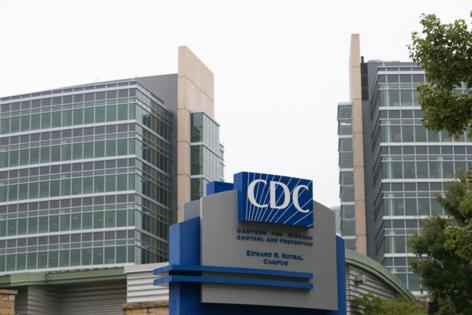CDC's new vaccine advisers recommend splitting up MMRV shot
Published in Parenting News
WASHINGTON — The Centers for Disease Control and Prevention’s vaccine advisory committee on Thursday voted to make a significant change to the nation’s childhood vaccine schedule during its first gathering since members were handpicked by Health and Human Services Secretary Robert F. Kennedy Jr.
The committee voted 8-3, with one abstention, to recommend against administering the combined measles, mumps, rubella and varicella vaccine to children before age 4. Instead, two separate shots would be recommended: an MMR vaccine and a separate varicella shot for chicken pox.
Although the Advisory Committee on Immunization Practices discussed changes to the hepatitis B vaccine schedule, members pushed the vote until Friday, when the panel is also set to discuss COVID-19 vaccines.
It is still unclear if the CDC will accept the recommendation. The director typically does, but the agency has no sitting head. The former director, Susan Monarez, said at a congressional hearing Wednesday that Kennedy told her the childhood vaccine schedule would change this month no matter what.
Any CDC vaccine schedule change is not a mandate. Rather, it generally determines which shots insurance companies cover. A family consulting with a physician can still choose to vaccinate a child. But data show when a vaccine is not on the schedule and requires payment out-of-pocket, families are far less likely to request it.
CDC vaccine advisory committee meetings often follow a routine cadence with little to no political discussion. But at the outset of Thursday’s meeting, newly installed ACIP Chair Martin Kulldorff panned Monarez and three other CDC officials who resigned after she was fired, adding that none of the former leaders contacted him about their concerns with the new committee’s credentials.
He also called out the six former CDC directors by name who criticized the new members and said they should all debate him in person. If they refuse, the scientists are not trustworthy, he said.
“False accusations that we and other respectable vaccine scientists are dangerous and unscientific … that just adds legitimacy to anti-vax positions, damaging both public health and the confidence in vaccines,” Kulldorff said.
“Such accusations are only logical if their purpose is political,” he added.
Newly installed voting member Cody Meissner criticized the American Academy of Pediatrics for boycotting the meeting over the firings of the previous members. Medical organizations typically comment at such meetings.
“The AAP is moving themselves to irrelevance,” Meissner said. “The importance of the AAP is going to wane if they refuse to participate in these conversations.”
In examining whether the MMR vaccine should be administered separately from varicella, also known as a chickenpox shot, the committee noted a recent study of 137,000 kids under age 7 that found an increased risk for febrile seizures 8-14 days after MMRV vaccination, compared to unvaccinated kids.
A similar study examined febrile seizures in children who received the MMR and varicella vaccine separately and found no increased risk within 30 days post-vaccination.
Current recommendations say a parent can choose either the combo or separate shots.
But requiring separate shots can decrease vaccine uptake, Meissner warned, and it’s not wise to make vaccine schedule decisions without significant data. He voted against the change.
“If we make a change in what has been a varied vaccine campaign I think we need to have a darn good reason,” said voting member Joseph Hibbeln, a former National Institutes of Health chief of nutritional neuroscience who also voted “no.”
The discussion of hepatitis B vaccines focused on whether they should be administered in the first 24 hours of life or delayed.
Since 1991, standard practice is that infants receive a hepatitis B vaccination soon after birth. The vaccination helps prevent mother-infant transmission and also protects babies from exposure during early childhood. Transmission is a problem because 12 to 16% of pregnant women do not receive prenatal screening for hepatitis B.
Without intervention, 85% of infants born to women with hepatitis B become infected. The disease can cause chronic liver problems and become deadly. Children infected early in life have the worst outcomes.
Meissner and Hibbeln repeatedly noted that pulling the birth vaccine could cause cases to balloon among infants. Testing of the birth mother is imperfect, they said, and doesn’t reveal if the infant lives in a household with someone who could transfer the disease.
Safety data show hepatitis B vaccine administered at birth does not present any increased risk of complications or death, and those who receive the vaccine have a decreased risk of bronchopulmonary dysplasia in addition to protection from the disease.
“It’s a very safe vaccine, a very pure vaccine. So we would be creating new doubts in the mind of the public,” Meissner said.
The hepatitis B vaccine debate was at the forefront of Wednesday’s hearing of the Senate Health, Education, Labor and Pensions Committee, where Sens. Rand Paul, R-Ky., and Roger Marshall, R-Kan., both doctors, questioned the need for it at birth.
But HELP Chairman Bill Cassidy, R-La., a physician who specialized in liver disease, was asked after that hearing if the American people should have confidence in the vaccine advisory panel if it makes changes in the childhood immunization schedule. He told reporters, “No.” Cassidy said he has seen people needlessly die of hepatitis B. In the decade following the approval of the birth dose of the vaccine, newborn infection decreased by 68%.
“Now, if the child gets vaccinated at age 4, most likely, and today, because of our success of preventing hepatitis B, the child will be OK, but I can promise you there will be some hepatitis B transmission” if the birth shot is removed from the vaccination schedule, he said.
©2025 CQ-Roll Call, Inc., All Rights Reserved. Visit cqrollcall.com. Distributed by Tribune Content Agency, LLC.










Comments